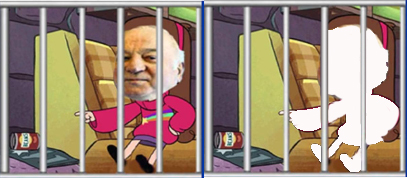

by John Helmer, Moscow
@bears_with
A new lawyer appeared in a London court on Friday claiming to represent Sergei (lead image, left) and Yulia Skripal. Jack Holborn, a barrister specializing in what he calls human rights, told Lord Anthony Hughes, who is conducting a public inquiry into the alleged Novichok death of Dawn Sturgess in 2018, that the Skripals should not be called to give evidence or testify in the case.
Holborn claimed the Skripals are fearful for their security. “No security measures are perfect”, he said.
Holborn has not been in contact with the Skripals, however. He refuses to answer questions put to him on what visual contact or other communications he has had with either Sergei or Yulia Skripal.
Instead, he was told what to say at the hearing by the law firm of Kingsley Napley which the British government is paying to show that the Skripals are participating in the Novichok case.
The spokesman for Hughes and the inquiry was asked to explain Holborn’s presence in court for the first time on Friday. She was also asked what authority the Skripals had given Holborn to represent them. The spokesman answered: “Kingsley Napley has been designated as the recognised legal representative of the Skripals under r[ule] 6 of the Inquiry Rules 2006. By rule 8, the recognised legal representative may appoint a team to assist them and Kingsley Napley have accordingly instructed counsel to appear on their clients’ behalf.”
In other words, there has been no contact between the lawyers who say they represent the Skripals, and the Skripals themselves. The judge and government are refusing to give evidence that Sergei Skripal is alive, and that Yulia Skripal is not in prison.
The problem for the British Government is that if the Skripals are allowed to give live evidence at the Hughes inquiry, there is no telling what they may say to contradict or discredit the six-year official narrative of the Russian Novichok attack in England.

For the transcript of the three-hour hearing in the High Court on June 21, click to read. For the archive of the Hughes inquiry, including earlier hearings and submissions, click on the website. Another preliminary hearing is likely in September before the open hearings commence on the scheduled date of October 28.
The lawyer for the inquiry, Andrew O’Connor KC, told Hughes on Friday morning this was a “difficult question as to whether either or both of Sergei and Julia Skripal should give oral evidence.” He also acknowledged there was the same problem in revealing what the Skripals have already said. “In the case of the Skripals, the transcripts of their police interviews have not yet been provided to CPs [Core Participants] but will be very shortly.”
In fact, the Skripal transcripts will be so redacted, the officials and lawyers admitted in court, it is uncertain what the Skripals believe had happened to them, and why. Release of the redacted Skripal transcripts from March of 2018 risks being contradicted by fresh written statements to the Hughes inquiry from the Skripals, so that form of testimony is also being barred.
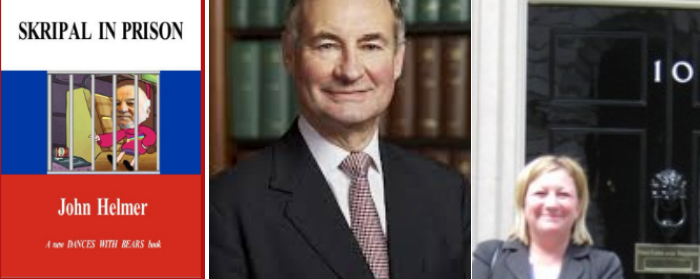
Read the only book published on the UK Novichok case and what has happened to the Skripals. Centre, Lord Anthony Hughes. Right, his spokesman Bernadette Caffarey at the Prime Minister’s residence.
Since March 4, 2018, when the Skripals slumped unconscious on a Salisbury town bench and were kept in hospital under police guard, three British prime ministers — Theresa May, Boris Johnson, and Rishi Sunak — have continued the story that three Russian military officers attacked the Skripals with a Novichok nerve agent they had brought by plane into England, and sprayed on to the door handle of Sergei Skripal’s home; that was several hours before he and his daughter showed symptoms and collapsed.
The British have presented no evidence of Novichok on the Skripal home door handle; in the blood, skin, and urine testing of the Skripals in hospital; or in subsequent inquest and court proceedings.
The alleged Russian attack weapon – a perfume bottle atomiser – did not materialize for months until July 2018, when police claim to have found it on a kitchen bench in the home of another alleged victim, Dawn Sturgess, ten days – repeat ten days — after exhaustive police searches of the house had failed to find it. The last Sturgess case report, dated in March when Hughes held his previous preliminary court session, can be read here.
Sergei Skripal has not been seen in public since the day of the alleged Novichok attack, March 4, 2018. He has not been heard on the telephone by family members in Russia since June 26, 2019. Yulia Skripal was last seen in a government-directed interview at a US bomber base in England in May 2018; her last telephone call to Russia was heard on November 20, 2020. The Skripals have not been seen or heard from since.
The full story of what happened and didn’t happen, and of the coroners court and High Court hearings which have followed since 2018, has been documented in the book published in 2020; then in reports of the ongoing cover-up by a retired Appeal Court judge, Lord Hughes.
Adam Chapman, a solicitor at the Kingsley Napley firm, had said nothing during the Hughes proceeding which preceded the June 21 session; read for details here.
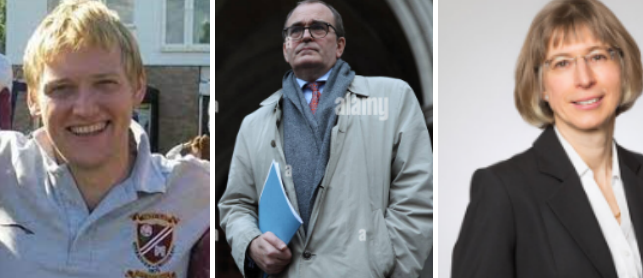
Lawyers for the government (left to right): Jack Holborn, barrister for the Skripals instructed by Adam Chapman (centre), a solicitor paid by the government to represent the Skripals; and Cathryn McGahey KC, the barrister for the Hone Office and intelligence and security services, MI6 and MI5. Holborn describes himself as the “go-to junior for various government departments and private clients”. He has been vetted by the government for work on the Attorney-General’s panels. These are “400 junior counsel who undertake civil and EU work for all government departments.”
The discussion of the Skripals was opened on Friday by Michael Mansfield KC. He represents the Sturgess family and is seeking a multi-million pound payment from the government, alleging it failed to protect Sturgess from the Russian attack. “The fact is,” he told the judge on Friday, “that both the Skripals were interviewed extensively at separate times in the same month [March-April 2018]. We don’t have any of the interviews. It makes it very difficult to — well, you can see where it’s going. So we don’t have any of the interviews.”
Mansfield meant to include interviews of the Skripals by the police, as well as by the secret services, MI6 and MI5.
Lord Hughes avoided the MI6 interviews. Referring only to the police, he asked “What about the interviews with the Skripals: why haven’t they been disclosed yet?” Replying for the Home Office and the secret services, Cathryn McGahey KC was evasive. The texts have gone for “checking”, she said. Hughes’s question “has to go to the Skripals’ representatives and to the police and to your team,” McGahey added.
Hughes replied that he accepts that state secrecy must cover much of what the Skripals reportedly said in their interviews in 2018. He omitted to ask if the Skripals have said anything on the record in the intervening six years when the Russian Embassy in London has repeatedly requested consular access to its nationals, and been refused.
“Given the surrounding circumstances of the Skripals,” Hughes said in court on Friday, “there is quite a lot of material that’s subject to a restriction order, but we know what that is.” What is left which isn’t classified, the judge added: “I want to know, please [sic], from in fact both those parties and you, Mr O’Connor [lawyer for the inquiry], a similar deadline for the service of the duly redacted Skripal interviews.”
Mansfield (right) for the Sturgess family then said he wants to know what the Skripals have said which might benefit the family’s claim that the British government had been negligent in protecting Sturgess from the Novichok when the alleged Russian attackers had been under close surveillance from their arrival in the UK.
Mansfield claimed he wants to know what the Skripals have said about the time leading up to the alleged attack on March 4, 2018, and the record of surveillance around Sergei Skripal’s government-supplied safe house, as well as his own security records. “So the weekend itself, and of course ending up with the door and the door handle. Then the final stage is, we say — which is important, and perhaps it comes before those two stages — and that is preventability. We say there are a lot of questions that arise out of that.”
The police interviews with the Skripals have not been identified in court with dates or locations. Although they were officially represented by a lawyer in London for a High Court hearing on whether blood testing might be carried out when they were reportedly unconscious in hospital, Mansfield doesn’t say if the Skripals were represented by a lawyer when they were being interviewed. He carefully avoided mention of interviews with the Skripals which have been carried out by other government agencies, including MI6 and MI5.
Mansfield reassured the judge and the government’s lawyers in court that he wants to do no more than cherry-pick the Skripal interviews with the police. He doesn’t want them to face cross-examination in the open inquiry, which is scheduled to start on October 28. “Besides the security aspect, they [the Sturgess family] are also aware of the trauma for the Skripals of having to come and give evidence of something they have already been through, which is pretty horrific by anybody’s standards, to ask them to do that. So they [the Sturgess family] are not anxious to have them called; they are, in a sense, protective of them.”
The judge then asked Holborn to speak for the Skripals. “A line does have to be drawn somewhere,” he began. Then he drew the line the British government is insisting on – nothing from the Skripals since the police interviews of six years ago, and nothing in the transcripts which the government doesn’t want to be known publicly. In short, a gag.
“Our primary position,” Holborn went on, “is that you [Hughes] will have sufficient — and of course you have seen the police interviews — to say we definitely don’t need them. But my fallback position is definitely: yes, it is no more than keeping it open – THE CHAIRMAN: All right. MR HOLBORN: — until the family are able to frame what questions they actually need to ask in light of the transcripts, which we suspect [sic] will provide a great deal of information.”
Holborn was conceding he hasn’t read the Skripal interviews himself.
He then told the court he doesn’t want the Skripals to say anything for themselves. “I would otherwise flag three limited points, the first of which is: no security measures are perfect.”
“THE CHAIRMAN: Yes. MR HOLBORN: The second of which, which the family have very fairly acknowledged, is the distress to the Skripals of giving evidence. The third of which is the point made in our most recent submissions that perhaps the issue of preventability may be better addressed by other core participants and really isn’t obviously a matter on which the Skripals can necessarily give the most helpful evidence, bearing in mind a lot of it will presumably relate to the aftermath of the incident.”
By “family”, Holborn was referring to the Sturgess family. He did not mean, and he has made no contact with the Skripal family in Russia.
The “recent submissions” Holborn says he has made to Lord Hughes remain secret. They have not been disclosed publicly on the inquiry website.
About “distress” and “preventability”, Holborn was lying. When they were last free to speak, neither Sergei nor Yulia Skripal showed distress over what has happened; they did reveal they had to talk quickly and in secret to avoid MI6 surveillance of their telephones. In the earlier interviews Sergei Skripal reportedly gave Mark Urban, an MI6 placeman at the BBC, he implied there was much he might tell about the MI6 net which was covering him until the Salisbury incident.
Holborn’s representation in court for the Skripals was so short, he omitted to say that they had told him anything ahead of his appearance before Hughes on June 21.
The judge then asked the Home Office lawyer Cathryn McGahey KC to respond. She confirmed there is a gag on the Skripals, and that this has been accepted in Holborn’s secret submission to the inquiry. “HMG [Her Majesty’s government] supports the submissions made by Mr Holborn on behalf of the Skripals,” she claimed before gagging herself. “There is no more I can say in open session. The safety of the Skripals is paramount.”
She then told the judge not to call the Skripals to testify either in writing or in open hearing. “Even if they were to be called,” McGahey said, “different considerations may very well apply to different topics, and the topic of preventability [read MI6] is one which will almost certainly be fraught with difficulty, unless there were very strict control over the questions. And most of the material is likely to be closed anyway.”
No questions are to be allowed for the Skripals; no answers from them, either.
Hughes said he proposed to come to a decision in secret. “My inclination is to await the disclosure of the interviews in particular, and any other material which comes with it, before making any final decision about the Skripals.”
Hughes has refused to say in open court that he has verified the Skripals are alive and free to instruct lawyers to represent them. Holborn also refuses to confirm that his clients are alive. He was asked by email four questions to clarify whether Holborn is representing the Skripals or the government which is paying his fee.
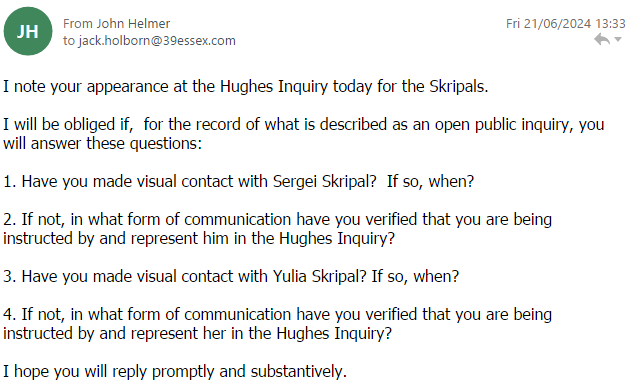
Holborn has not responded.

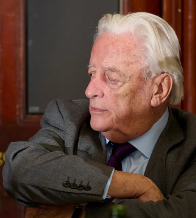












Leave a Reply